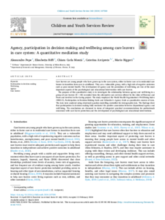Care leavers are young people who have grown up in the care system, either in foster care or in residential care homes in transition from care to adulthood. They are a vulnerable group, with a high risk of negative outcomes such as poor mental health. The development of agency and the promotion of well-being are two of the most important aspects of the psychological and educational intervention with care leavers.
The purpose of this quantitative study is to investigate the relationship between agency and well-being in a group of care leavers (N = 48) recruited from the alternative care services offered by the cities of Florence and Prato and involved in the Caring project. The study employed the World Health Organization's Well-Being Index (WHO-5), Participation in Decision Making Scale and Schneider's Agency Scale as quantitative sources of data. The data were analyzed using structural equation modelling controlled for demographic data. The findings show that participation in decision making fully mediated the positive association between dispositional agency and well-being. The conclusions are discussed in terms of integrated practical recommendations for professionals concerned with care leaver protection and the development of psychological and educational interventions.

